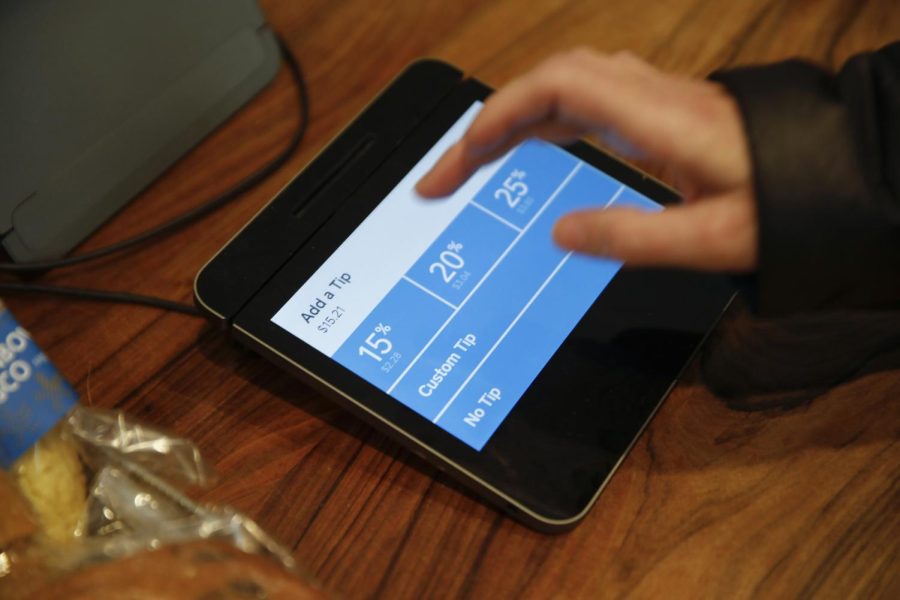Have you ever questioned if tipping culture has gone too far? When you’re staring at an iPad POS system, debating whether or not you should add an extra dollar onto your already $7 iced coffee, and feeling all eyes on you, it’s tough not to.
The new tipping culture is complicated at best. As automatic prompts have replaced glass tip jars in quick-service restaurants, coffee shops, and other businesses, technology has drastically altered the way we tip. What was once a way to acknowledge good service has now begun to feel like an obligation.
In 2023, the meaning of gratuity is anything but clear. It has become increasingly difficult for customers to know when and how much to tip.
During Covid-19, we were encouraged to support both small and large businesses by tipping for their services as a means to help keep them operating normally. However, with the pandemic coming to a close, the pressure placed upon customers to perform the gesture of kindness seemingly has no end in sight. With inflation already spiking the prices of everyday items and common goods, customers are fed-up with being nagged to tip at nearly every register they face. This frustration is mainly aimed towards businesses that are nudging customers to leave gratuity for services that don’t typically warrant it.
In the restaurant industry, customers are generally accustomed to tipping. This is because servers, whose majority of their paychecks come from the tips they accumulate during their shifts, often provide a level of service in which the act of tipping is justified. Servers take orders, carry out food and beverages, check in throughout the meal, and make any adjustments if necessary. All while simultaneously hosting several other tables.
Although customers are habituated to giving gratuity after sit-down restaurant service, should they be held accountable to pay the difference of servers’ wages through this gesture?
Restaurant employers have neglected the responsibility to pay their employees fair wages, as most servers’ hourly pay is under the statewide minimum wage. As these wages fail to fall entirely into the hands of their employers, customers are automatically expected to leave a tip at the end of their meal when they dine-in. Nowadays, if customers don’t tip their servers, they are considered rude, cheap, and disrespectful, regardless of the service quality that they were given. This aspect alone makes the concept of tipping much more complicated than it should be.
The topic of gratuity becomes even more confusing when the level of service, or lack thereof, does not necessarily provide the grounds for one.
With automatic gratuity prompts, customers are encouraged to leave a tip for small tasks such as picking up a take-out order or being handed a pastry through a drive-thru window. Self-serve frozen yogurt and boba businesses, where the only service being provided is the exchange of a plastic spoon or straw for a form of payment, also prompt you to tip at the register. These services simply don’t justify gratuity. If they were to, shouldn’t we also tip retail workers, grocery store clerks, and bus drivers?
When a cashier spins around an iPad to request a tip after taking your order, it’s hard not to wonder what exactly you’re tipping for. However, under an unusual amount of pressure or maybe in fear that your order will be manipulated, you may leave a tip. Even if you don’t necessarily want to or feel that the service you were provided was worthy of one. It is the art of “guilt-tipping.” It no longer feels like a kind, genuine, or optional gesture when both the cashier and the 15%, 20%, and 25% gratuity options on the screen are staring directly back at you.
It is unclear what exactly we are giving gratuity for these days. Is it for the quality of service? Or are we just rewarding employees for simply doing their job?
The direction that tipping culture has started to take lacks clarity. Businesses that don’t traditionally request gratuity for their services have begun to, which has created an uncomfortable atmosphere for customers when it’s time for them to pay. Some customers tip regardless of the type and quality of service provided, while others feel guilty or embarrassed if they don’t. Many customers don’t tip at all. With the constant development of technology and the lingering effects of the pandemic, customers will continue to grapple with the concept of gratuity.



Jeannie Lewis • May 2, 2023 at 8:42 pm
At Starbucks, I always feel dread when the tip option comes up! I always press no tip but it’s uncomfortable! I do feel guilty! Thanks for sharing this!